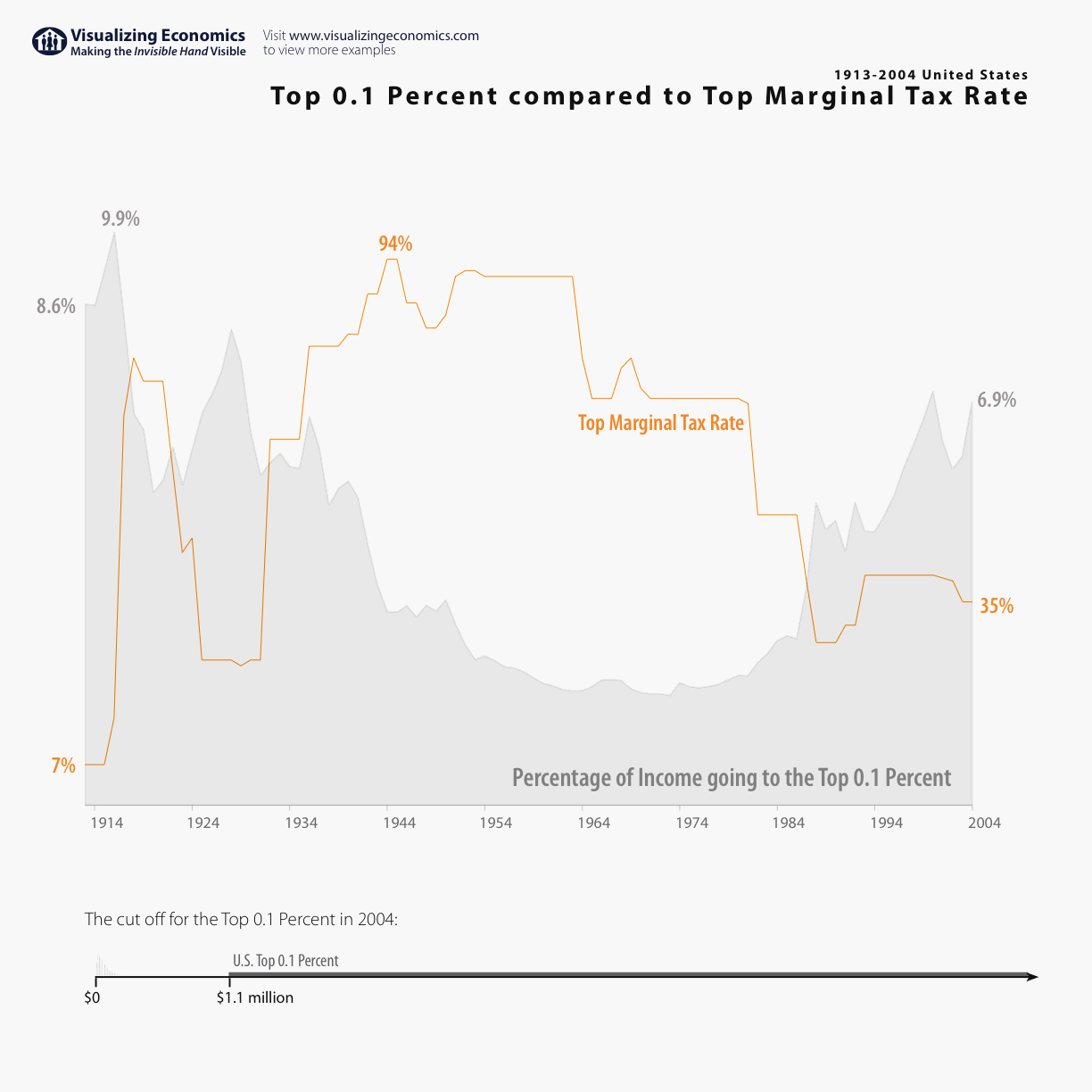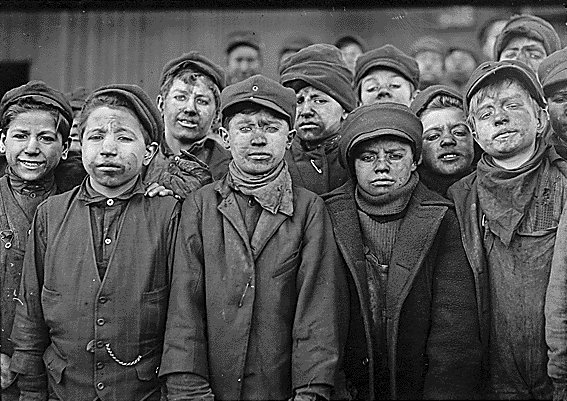Wealth Inequality in America
- Thread starter SideGeek
- Start date
You are using an out of date browser. It may not display this or other websites correctly.
You should upgrade or use an alternative browser.
You should upgrade or use an alternative browser.
That's true. But think about it, most people have some sort of contribution that is considered vital to the society. Nurses, people serving the country (law enforcement, military, etc.), construction workers, engineers, farmers, etc. All of these people work their asses off every day of the week only to just scrape by their mortgages, college fees, medical bills, transport, food and others. I wouldn't consider the work these people do fall under the category of mere existence.
Are you sending them some of your spare income? If not, why not? Sounds like a great start and you'll be backing up your words with action.
You're free to distribute every last penny you have to those who are "beneath" you. Let me know how that works out for you, and for them.
The problem is that the current inequality in America isn't good for the country. Huge wealth inequality is usually a bad sign and weakens countries. Also remember that Wall Street(which makes up a huge portion of the top 1 percent) doesn't really create actual value. A huge part of the inequality in wealth is the wealth transfer from Main Street to Wall Street.
6 years from the end of highschool is NOT a long time in the medical world.
Some states and/or schools require 1 to 2 years of working as an RN before acceptance into a NP program. Not to nitpick, but there's a small chance that someone reading this might want to go into that field, so it's something they should be aware of.
The problem is that the current inequality in America isn't good for the country. Huge wealth inequality is usually a bad sign and weakens countries. Also remember that Wall Street(which makes up a huge portion of the top 1 percent) doesn't really create actual value. A huge part of the inequality in wealth is the wealth transfer from Main Street to Wall Street.

You're free to distribute every last penny you have to those who are "beneath" you. Let me know how that works out for you, and for them.
I am indeed free to do so. However, this is in relation to the fact that workers keeping less and less of the fruits of their productivity and more of it going to the top. This won't work out for any of us, as it decreases overall buying power and further moves us to an economy dependent on credit.
My brother-in law barely graduated high school, and never went to college. What he did do is learn a trade, and so now as an electrician he pulls down 6-figs.
Learn to provide a valuable service and your bills will always be paid. Wait around for something to be handed to you and you'll be waiting on handouts your whole life.
Some reiteration. The people losing buying power are also providing a valuable service. They have jobs; jobs that once paid a living wage. They are not people waiting for handouts (yes those people exist as well), they are people performing a function that serves a purpose. They are a functional part of our ever-growing GDP. Yet they are keeping less and less of their earnings as more of it stays at the top. This isn't good for the economy as it reduces buying power and leaves it more depending on unstable credit.

Wealth inequality, and yet a large % of people below the poverty line could live very comfortably in other countries. Not to mention, they have endless knowledge and skills available for free via the internet.
Yes but that's because of a difference in currencies and a cost of living. I can rent a nice house in Mexico for the equivalent of $500/month but it won't rent me a room in Los Angeles. And in Mexico, earning enough to afford a $500/month for rent is comparatively rare. These comparisons are even more disparate if we start comparing the US to non-OECD countries.
My point is, it's not an even comparison.
Some reiteration. The people losing buying power are also providing a valuable service. They have jobs; jobs that once paid a living wage. They are not people waiting for handouts (yes those people exist as well), they are people performing a function that serves a purpose. They are a functional part of our ever-growing GDP. Yet they are keeping less and less of their earnings as more of it stays at the top. This isn't good for the economy as it reduces buying power and leaves it more depending on unstable credit.

1. What is the cause of this loss in purchasing power?
2. What is the solution?
Lets take advice from someone who tries to make a good first impression with a picture of a gigantically stupid space gorilla.
If workers kept less of their fruits than they deserved, theyd eventually be made aware of that and walk away. Thats how freedom works. In your convoluted marxist brain, its obviously not that easy.
Ignoring the fact that stock options are a real thing for a lot of employees, no worker was ever forced to work for a certain employer. What he makes is the result of contract negotiations between him and his employer. If hes not getting his fair value, youre basically saying hes stupid. Whos the elitist bitch now?
That whole money circulation thing is bullshit. That argument is so cute. Like you imagine the 80billion Gates owns sitting on some .5% annual returns commercial bank account gathering dust.
You dont get pats on the back for reiterating bullshit unless youve got tenure.
They keep the entirety of their earnings minus taxes. Do you mean we should reduce taxes? Probably not, but thats what youve said. Great job.
And money can not become less efficient by ending up in the hands of those who have acquired it by showing that they are efficient at handling money.
It doesnt even make sense from some bullshit ideology point of view. You communist fags want all the money to be handled by a select few non-ambitious goodwill freaks. And to make their job easier, you take market mechanisms away from them. $15 trillion. Thats the US GDP. You want the entirety of that to be held by some idiots? That sum could only be figured out because that money had been measured against something. Assuming communism, you have no fucking clue how much money youve got. Money is not real. Theres no value attached to it, other than someone saying he wants x amount of money for his products. Its completely non-functional. If it were to disappear today, people would be paid in ammo, tobacco or whatever dresden has hoarded in his swastika-shaped silos.
Non oecd countries like singapore? OECD is just some circle-jerking boys club for rulers who are so insecure about their people supporting them that they want to outlaw competition between sovereign nations.
I am indeed free to do so. However, this is in relation to the fact that workers keeping less and less of the fruits of their productivity and more of it going to the top. This won't work out for any of us, as it decreases overall buying power and further moves us to an economy dependent on credit.
If workers kept less of their fruits than they deserved, theyd eventually be made aware of that and walk away. Thats how freedom works. In your convoluted marxist brain, its obviously not that easy.
Ignoring the fact that stock options are a real thing for a lot of employees, no worker was ever forced to work for a certain employer. What he makes is the result of contract negotiations between him and his employer. If hes not getting his fair value, youre basically saying hes stupid. Whos the elitist bitch now?
That whole money circulation thing is bullshit. That argument is so cute. Like you imagine the 80billion Gates owns sitting on some .5% annual returns commercial bank account gathering dust.
Some reiteration. The people losing buying power are also providing a valuable service. They have jobs; jobs that once paid a living wage. They are not people waiting for handouts (yes those people exist as well), they are people performing a function that serves a purpose. They are a functional part of our ever-growing GDP. Yet they are keeping less and less of their earnings as more of it stays at the top. This isn't good for the economy as it reduces buying power and leaves it more depending on unstable credit.

You dont get pats on the back for reiterating bullshit unless youve got tenure.
They keep the entirety of their earnings minus taxes. Do you mean we should reduce taxes? Probably not, but thats what youve said. Great job.
And money can not become less efficient by ending up in the hands of those who have acquired it by showing that they are efficient at handling money.
It doesnt even make sense from some bullshit ideology point of view. You communist fags want all the money to be handled by a select few non-ambitious goodwill freaks. And to make their job easier, you take market mechanisms away from them. $15 trillion. Thats the US GDP. You want the entirety of that to be held by some idiots? That sum could only be figured out because that money had been measured against something. Assuming communism, you have no fucking clue how much money youve got. Money is not real. Theres no value attached to it, other than someone saying he wants x amount of money for his products. Its completely non-functional. If it were to disappear today, people would be paid in ammo, tobacco or whatever dresden has hoarded in his swastika-shaped silos.
Yes but that's because of a difference in currencies and a cost of living. I can rent a nice house in Mexico for the equivalent of $500/month but it won't rent me a room in Los Angeles. And in Mexico, earning enough to afford a $500/month for rent is comparatively rare. These comparisons are even more disparate if we start comparing the US to non-OECD countries.
My point is, it's not an even comparison.
Non oecd countries like singapore? OECD is just some circle-jerking boys club for rulers who are so insecure about their people supporting them that they want to outlaw competition between sovereign nations.
1. What is the cause of this loss in purchasing power?
2. What is the solution?
There's no ONE reason, and some of it I believe is an unavoidable consequence of a globalization and an economy that becomes more technological/automated.
However, I would argue that much (or even most) of it comes from decades of union-busting and a tax policy that's shifted (lower taxes on corporations and the wealthy, shifting the burden to middle income earners). Not only do these correlate chronologically within the US, they also correlate internationally (both of these changing policies AND the corresponding growth in income disparity are largely specific to the US, and not really seen in other OECD countries).
This chart is a little old. Mexico and Chile are now OECD countries and both have a greater disparity than then US.

Top marginal tax rates and corresponding income going to the top

Unionization....

These are policies that have been put into effect. These aren't uncontrollable variables. This can be remedied by at least a partial rolling back. Strengthen unions and (temporarily) roll back taxes on the top earners to where they were under Reagan. Use that money to invest aggressively in higher education. We need more engineers in hardware, software, as well as emerging technologies. Not only will they innovate but we'll have a population with more purchasing power which at the end of the day, is better for all of us (more people who can afford our services and/or the products/services our would-be clients can then hire us to market).
Lets take advice from someone who tries to make a good first impression with a picture of a gigantically stupid space gorilla.
If workers kept less of their fruits than they deserved, theyd eventually be made aware of that and walk away. Thats how freedom works. In your convoluted marxist brain, its obviously not that easy....blah blah....
Non oecd countries like singapore? OECD is just some circle-jerking boys club for rulers who are so insecure about their people supporting them that they want to outlaw competition between sovereign nations.
It's too bad you don't realize how ignorant you actually are and feel the need to throw insults around in order to compensate for your obvious lack of knowledge. You are regurgitating talking points you mistake for facts. Assertive ignorance like yours is the worst kind.
1- No, that is now how "freedom works" (outside of your cartoon "freedom dust" world). If all of the jobs are paying in an industry are only paying a certain amount then workers choose between shit-paying jobs. This is why the pre-unionized days looked like this.

And why it's starting to look like this again as union-busting continues to push them back into their old state or virtuall irrelevance.
Is this getting through to your one-track mind? Overall, the leverage between employer in and employee (in most industries) leaves the employees at the shallow end of the bargaining table. It's either work for a low wage or starve. This is simply how it works in the real world, outside of YouTube.
2- That you think money circulation is bullshit proves your ignorance. Nothing in this economy exists in a vacuum. At the end of the day, everyone's income is someone else's spending, and vice versa. Bill Gates doesn't circulate money back into the economy at the same rate thousands of workers with that money would. Bill Gates won't buy thousands of cars and TV's or dine at thousands of restaurants in a week. This is one of the reasons why Bill Gates agrees with raising taxes on the wealthy.
Bill Gates: 'Have to raise taxes' - MJ Lee - POLITICO.com
3- That you muddle money "being efficient" with money actual demand shows you have too many wet dreams of Ron Paul. The money can efficiently be "invested" in accounts in the Cayman Islands, or even on large amounts of luxury items that don't actually create new jobs. Sometimes the most "efficient" thing to do with your money is to hide it or move it offshore. A worker with with money will invest it directly into the economy, which will in turn help create more jobs.
4- Money is real. It amounts to buying power that the world runs on. I'm sorry you are so simple that you are confused by abstract concepts.
5- Yes you freemarket fanatcis love Singapore. What those crappy Peter Shift videos won't tell you: Singapore's State-Owned-Enterpries account for 23% of its economy (higher than most OECD countries). In other words, it's really not your shining "less government" beacon you think it is.

But yes, hold onto your shining example of a country with 6 million people and ignore the reality of most countries with small governments.

Before anyone else ignorantly tosses the "communism" card around , maybe watch this...
Banned TED Talk: Nick Hanauer "Rich people don't create jobs"
(Nick Hanauer is a successful venture capitalist).
[ame="http://www.youtube.com/watch?v=CKCvf8E7V1g"]http://www.youtube.com/watch?v=CKCvf8E7V1g[/ame]
Banned TED Talk: Nick Hanauer "Rich people don't create jobs"
(Nick Hanauer is a successful venture capitalist).
[ame="http://www.youtube.com/watch?v=CKCvf8E7V1g"]http://www.youtube.com/watch?v=CKCvf8E7V1g[/ame]
And why it's starting to look like this again as union-busting continues to push them back into their old state or virtuall irrelevance.
As someone who used to deal with the UAW's shit for years, I can tell you that unions need to be busted. Nothing fucks up productivity better than a union, and the only workers that like the union are the ones that need a union because they're lazy or untalented. Good workers would always rather bid their services out in a free market.
I can't tell you how many talented people I lost because they couldn't bare to be paid the same as some useless fucking mop-holder. Fuck unions.
As someone who used to deal with the UAW's shit for years, I can tell you that unions need to be busted. Nothing fucks up productivity better than a union, and the only workers that like the union are the ones that need a union because they're lazy or untalented. Good workers would always rather bid their services out in a free market.
I can't tell you how many talented people I lost because they couldn't bare to be paid the same as some useless fucking mop-holder. Fuck unions.
Yes, "fuck unions" has been the motto we've followed for 30 years now and with the effect of a middle/lower income earners who earn less and less relative to rising costs of living, while CEO wages explode and more money is shifted to quarterly gains. Of all the union workers I've known, only one was anti-union and he only understood the part about "having to pay union dues" and had no clue that the union allowed him to make more money.
Unions do more than just ensure higher pay for union workers; they cause non-unionized competitors to pay competitive wages in order to compete for good workers.
Having said all of this, I do acknowledge that there are some problems with unions and I do think the UAW got away with too much for too long.

Top marginal tax rates and corresponding income going to the top

To counter this graph, I am posting this picture below that makes as much statistical sense.

There's no ONE reason, and some of it I believe is an unavoidable consequence of a globalization and an economy that becomes more technological/automated.
However, I would argue that much (or even most) of it comes from decades of union-busting and a tax policy that's shifted (lower taxes on corporations and the wealthy, shifting the burden to middle income earners). Not only do these correlate chronologically within the US, they also correlate internationally (both of these changing policies AND the corresponding growth in income disparity are largely specific to the US, and not really seen in other OECD countries).
This chart is a little old. Mexico and Chile are now OECD countries and both have a greater disparity than then US.

Top marginal tax rates and corresponding income going to the top

Unionization....

These are policies that have been put into effect. These aren't uncontrollable variables. This can be remedied by at least a partial rolling back. Strengthen unions and (temporarily) roll back taxes on the top earners to where they were under Reagan. Use that money to invest aggressively in higher education. We need more engineers in hardware, software, as well as emerging technologies. Not only will they innovate but we'll have a population with more purchasing power which at the end of the day, is better for all of us (more people who can afford our services and/or the products/services our would-be clients can then hire us to market).
wickedfire has a new undisputed king of outdated graphs.
Unions do more than just ensure higher pay for union workers; they cause non-unionized competitors to pay competitive wages in order to compete for good workers.
Wrong. What unions do is equalize pay, which means some workers get paid more than they're worth and some get paid less than they're worth. This incentivizes people to do less work, since you're going to get paid the same regardless.

